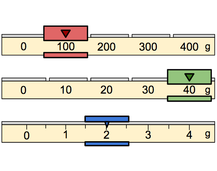This state of matter has the lowest energy particles.
What is solid?
These two things happen to the particles in matter when you heat them up.
What is speed up and spread out.
This formula can be used to calculate the volume of a cube or rectangular prism.
What is V = l x w x h ?
This is the density, including units, of a 10 g mass that occupies 5 mL of space.
What is 2 g/mL?
This is what happens to the density of water when it is heated up.
What is decreases?
This state of matter has the most space between its particles.
What is gas?
When matter is cooled, this is what happens to its density.
What is increases?
This piece of equipment is used to find the mass of an object.
What is a balance scale?
A 3 cm3 block with a density of 1 g/cm3 has this mass.
What is 3 grams?
Unlike most other types of matter, this substance's density decreases when it changes from liquid to solid.
What is water (or ice)?
This is the process a liquid turning into a gas.
What is evaporation?
These are the smallest pieces of matter, and are the building blocks of molecules.
This method is used to find the volume of an irregularly shaped solid.
What is the water displacement method?
50 g of a liquid with a density of 10 g/mL, takes up this much space.
What is 5 mL?
This is the densest liquid occurring naturally on Earth.
What is mercury?
This is the process of a solid turning into a liquid.
What is melting?
Kinetic energy is the energy of this.
What is motion?
This piece of equipment is used in the science lab to measure the volume of a liquid.
What is a graduated cylinder?
This is the mass of a 2 cm3 object that has a density of 0.5 g/cm3.
What is 1 g?
These two gases are the only two gases with densities lower than air.
What are hydrogen and helium?
This is the process of a solid turning into a gas.
What is sublimation?
Matter changes state when this form of energy is added or taken away.
What is heat?
This is the mass reading seen here:
What is 142 grams?
This is the density of a 16 g cube with sides measuring 2 cm.
What is 2 g/cm3?
This is the mathematical formula used to calculate density.
What is D = m/V